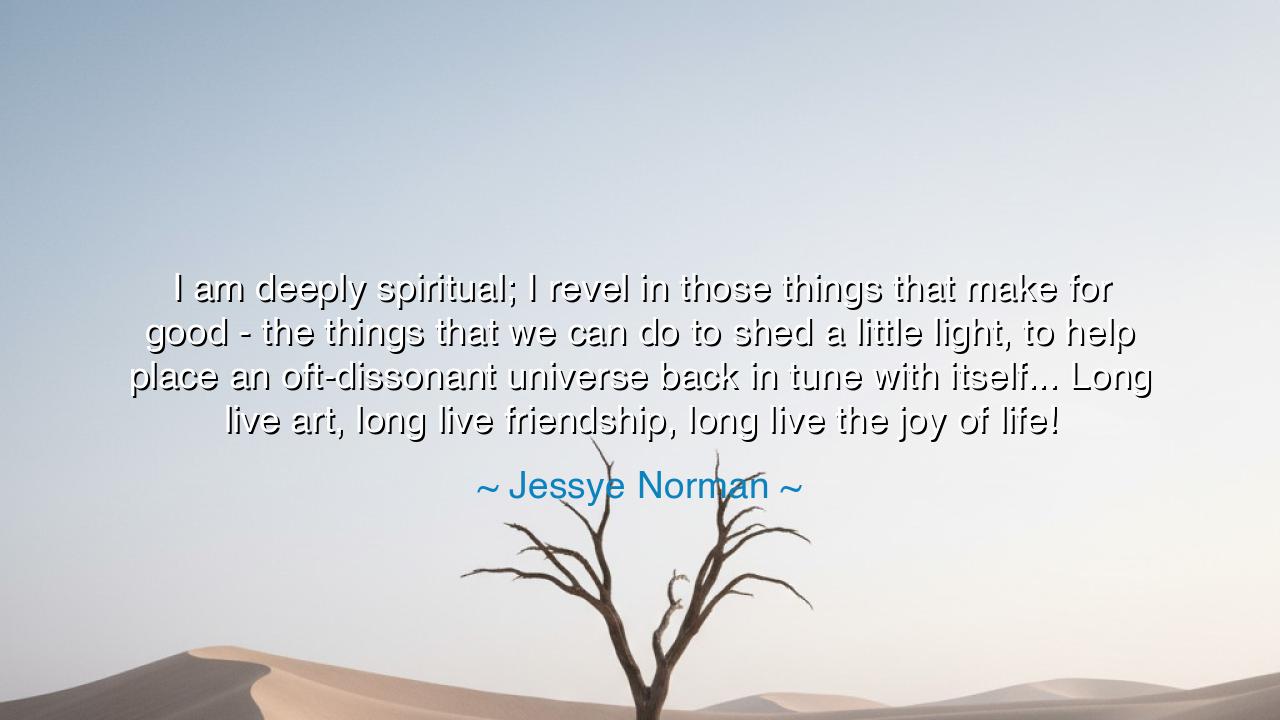
I am deeply spiritual; I revel in those things that make for good
I am deeply spiritual; I revel in those things that make for good - the things that we can do to shed a little light, to help place an oft-dissonant universe back in tune with itself... Long live art, long live friendship, long live the joy of life!






"I am deeply spiritual; I revel in those things that make for good - the things that we can do to shed a little light, to help place an oft-dissonant universe back in tune with itself... Long live art, long live friendship, long live the joy of life!" These powerful words from Jessye Norman echo the eternal truth that the pursuit of the good, the true, and the beautiful is at the heart of what it means to be human. Her declaration is a celebration of life itself—a life that, while filled with struggle and dissonance, can be made harmonious through the acts of art, friendship, and the joy of existence. In these words, Norman reminds us that, in the face of a chaotic world, it is our spiritual connection to each other, to beauty, and to love that has the power to restore the universe to its rightful order.
At the core of Norman’s message is the concept of spirituality—a force that connects us to something greater than ourselves, something that transcends the mundane and touches the divine. This is a force that has been recognized and revered by sages, poets, and philosophers throughout the ages. Consider Socrates, who, when questioned about the purpose of life, proclaimed that the highest form of human existence was the pursuit of virtue—a pursuit that was inherently connected to the spiritual aspects of our nature. For Socrates, the good life was not one of material wealth or power, but one lived in harmony with truth, justice, and the divine order of the cosmos. Norman’s reverence for spirituality mirrors this ancient understanding that true fulfillment comes not from the accumulation of riches, but from the alignment of our actions with the higher good.
And yet, while spirituality is vital, it is not enough to simply contemplate the divine from afar. Norman urges us to engage with the world, to “shed a little light” and to take active steps to restore harmony in a universe that often seems out of tune. This is where the importance of art comes into play. Art, as Norman suggests, is not just a pastime or a luxury; it is a vital force that brings light to darkness and order to chaos. Just as Apollo, the god of music, was said to heal the dissonance of the world with his lyre, so too does art have the power to heal the wounds of the world. It is through creativity, through the expression of our deepest emotions, that we find the means to restore balance in our lives and in the world around us.
The ancients understood the power of art in much the same way. Consider the great works of Homer and Sophocles, whose epic tales have transcended time and continue to inspire us today. The Greeks believed that art—whether in the form of music, poetry, or theater—was not merely a reflection of human experience, but a divine force capable of transforming souls. Through the power of their words, these artists brought both tragedy and joy into the world, forcing us to confront the deepest aspects of human existence. In this way, art serves as a bridge between the mundane and the sacred, allowing us to glimpse the higher truths of life and to align ourselves with the cosmos.
But even as art heals and transforms, it is not the only force capable of bringing order to the world. Friendship, too, is a profound spiritual force, one that, as Norman wisely notes, is essential to the joy of life. The bond of friendship is often spoken of in ancient texts as the highest of human virtues. Aristotle wrote that a true friend is a mirror of one’s own soul, reflecting both the best and the worst parts of ourselves. It is in friendship that we find companionship, support, and growth. Just as David and Jonathan shared a bond of loyalty that transcended their circumstances, so too do we find strength in those who walk beside us in times of joy and sorrow. Friendship is the foundation upon which we build not only our emotional well-being, but our spiritual growth.
The lesson here, then, is clear: in a world filled with dissonance, we must engage in the spiritual work of bringing light into the darkness. Art, friendship, and the joy of life are the instruments with which we can restore harmony to a chaotic universe. Like Norman, we must revel in these forces, knowing that they are not mere distractions, but essential to the health of our souls and the collective soul of humanity. To be spiritual is not simply to contemplate the heavens; it is to engage with the world around us, to create, to love, and to find joy in the simple act of being.
In our own lives, we must cultivate these forces. Let us create—whether through music, art, writing, or any form of expression that connects us to the divine within. Let us cherish our friendships, offering support, compassion, and loyalty to those who walk beside us. And let us, above all, celebrate the joy of life, knowing that it is through spirituality, art, and friendship that we find the deepest meaning in our existence. Long live art, long live friendship, and long live the joy of life, for it is in these things that we find our true purpose and our place in the grand tune of the cosmos.






AAdministratorAdministrator
Welcome, honored guests. Please leave a comment, we will respond soon